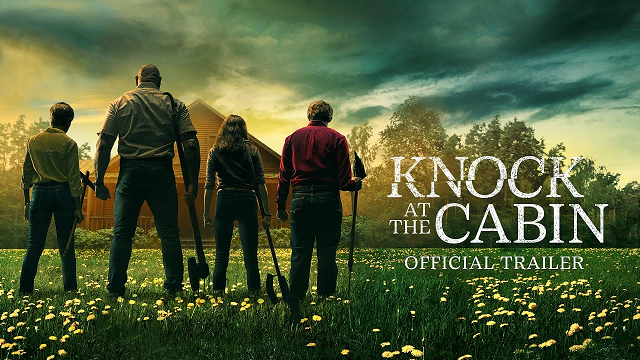Posted on April 6, 2023
SPOILERS for both The Cabin At The End of the World by Paul Tremblay AND M. Night’s movie adaptation A Knock At The Cabin.
Proceed with caution if you haven’t read/seen these.
The movie and book pace each other very closely for the first 2/3 of the story before branching off in wildly different directions. And let me tell you, folks, whether you’re reading or watching, this is one compelling story.
We open with Wen, the pre-teen adoptee of a gay couple, Eric and Andrew — NOT Eric Andre’ though that would be an entirely different, but also highly watchable, story — who have headed to a cabin in the mountains for a much needed vacation.
Wen is out catching grasshoppers when the very large man, Leonard, shows up and starts making gentle, pleasant conversation with her. In the movie, he’s played by Dave Bautista in an impressive display of the acting chops we always suspected he had.
But when three other people show up, all of them toting bizarre, homemade weapons, she gets nervous and runs to the cabin. These four people, Leonard, Sabrina, Adrian, and Redmond, announce they have been sent by God to demand a willing sacrifice.
If they don’t do this, then one of the visitors will be sacrificed and one portion of mankind will be afflicted. They don’t offer up a sacrifice, because who would do that? These people sound crazy.
And if you think they sound crazy, wait until Redmond puts a bag over his head so the other three can beat him to death with their weird rake-axes and bat-hatchets.
Remember, Wen is seven years old. And they do this in front of her.
“Since you have not chosen, a portion of mankind has been judged.”
The book and the movie remain closely tied at this point and, in both, Andrew manages to escape and get the gun from his car. But that’s the last similarity.
In the book. Wen is killed by an errant bullet. This affects Sabrina so deeply she kills Leonard and leads Eric and Andrew to Redmond’s car so they can escape. Eric and Andrew decide to let the world die and to spend what time they have left together.
In the movie, Leonard kills himself as the last of the visitor sacrifices, explaining beforehand that his death will not avert the apocalypse. Only Eric or Andrew can do that. After Andrew offers up himself, Eric takes Wen to find Redmond’s truck and they drive to a nearby diner where survivors of the plagues watch CNN as breathless announcers explain that planes have stopped falling out of the sky and the disease has stopped spreading, etc.
I prefer the book’s ending, except for one thing which I’ll get to later, because this is a very complex story with no win to be had. Five people end up dying to “stop the apocalypse” but it’s an apocalypse we only see glimpses of on television, glimpses that Eric points out could easily be faked by a bunch of fanatics who met online.
This is not a story crying out for a happy ending. Or even any resolution to the chaos. The movie builds a tremendous amount of tension by never resolving whether the apocalypse is real only to let the air out at the end by explaining, in some really heavy handed dialogue, that it was real and it’s all better now.
What I don’t prefer from the book is Wen’s death. I’m a dad. I don’t like it when kids or dogs get killed in stories. Sue me.
But also, Andrew’s willing sacrifice just brings so much more complex emotion to the story than Wen’s accidental death. But, again, see above, kids being killed takes me out of a story.
So, if I had made the movie, I would have done everything M. Night did but I would have rolled credits as they drove off in the pickup and we never would have seen the diner.
By the way, people (like me, often, unfortunately) carp at Shyamalan about his addiction to “twist endings” that can ruin otherwise good films and his sometimes sloppy story logic, but when you see something like Knock at the Cabin, you remember how good a director he really is.
That “happy ending” stinks of studio interference so it may have been tacked on by executive notes. It doesn’t ruin the movie. It’s still an excellent watch. It’s just that the emotional intensity with which you’ve been gripped for the last 80 minutes is suddenly allowed to escape like the air from a damaged tire.
Both the book and the film are powerful and complex works. Both are highly recommended here.


Recent Comments